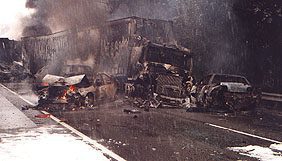This morning’s announcement by London Police that their “ordinance division” (bomb squad) had defused a “viable device” near Piccadilly Circus demonstrates yet again that the world is not yet a safe place. While, no organization has claimed responsibility for this bomb, reports indicate that the device was of sufficient sophistication as to include vehicle fuel tanks, propane gas cylinders as part of the incendiary charge as well as anils for shrapnel.
Multiple studies, including a June, 2006 report by the Institute of Medicine, have decried the fact that terrorism and national preparedness in general have fallen from the main public debate despite response catastrophes such as Katrina and the recent tornadoes, wildfires, and floods that have plagued various regions of the United States.
Even as the candidates line up in droves more potential presidential consideration, that the public debate centers more on the issue of keeping out individuals on whom our economy relies rather than excluding those who would seek to do us harm.
In the long history of disaster response in the United States, we have been fortunate to have enjoyed great success with a rather haphazard approach to our preparedness and security. Individual portions of the system have worked extremely well, including planning by the Federal Emergency Management Agency (FEMA) and its sister departments at the various state and local levels.
Rescue has been well represented by local EMS, Fire Rescue, Urban Search and Rescue, and Coast Guard Units. Medical response for the last two decades has been the purview of the National Disaster Medical System and its various medical venture, veterinary and mortuary response teams. These have been in the recent year been augmented by State Medical Response Teams and the all volunteer Medical Reserve Core. These medical assets served with success and distinction in virtually every declared national disaster since their inception in 1986, providing medical care to survivors and rescuers alike.
Response activities have been augmented by various volunteer and charitable organizations including pay based organization, the American Red Cross we have shelter, clothes and beds for those who have been displaced as well as for those who have come to serve, to assist the survivors. Recovery has been a mutual effort involving various aspects of Federal Government, charitable organizations, local communities, corporations and even individuals. The ad hoc group has clustered around the only organized recovery system that our nation has had for the last 20 years, FEMA. Through it all rescue response and recovery had been augmented by our national guard and in our greatest of tragedies, the men and women of our armed services.
In an era of terrorism, law enforcement has played a critical role in both interdiction and at times capture of those who would attack innocent civilians. Despite the injustice of these acts our society has insisted that our judicial system mete out our just retribution.
Despite the tremendous assets brought to bear, it has only been since 2003 that there has been a National Response Plan and that plan has only had form and framework since 2004. Both healthcare and non-healthcare corporations in this country have failed to take up their mantle of responsibility and even some communities have preferred to believe it could not happen to them… that it could not happened again.
Today’s “near miss” in London, a car bomb left on a busy thorough fare, in front of a popular nightclub, just down the street from 10 Downing street and Buckingham Palace demonstrates how vulnerable we all are. Today Londoners are lucky, how long will the United States rely on luck alone.










